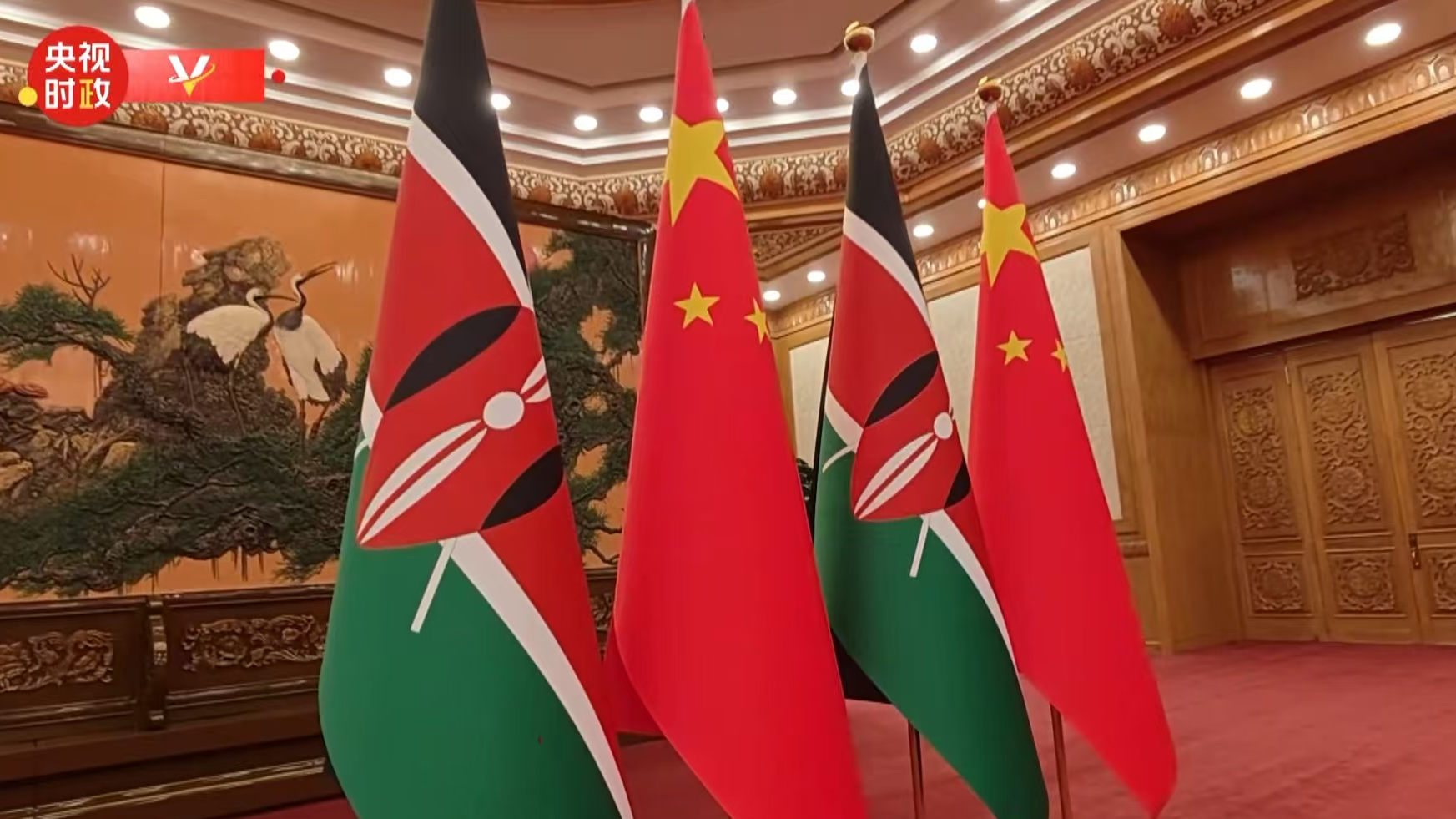By continuing to browse our site you agree to our use of cookies, revised Privacy Policy and Terms of Use. You can change your cookie settings through your browser.
I agree
Search Trends
CHOOSE YOUR LANGUAGE
- Albanian Shqip
- Arabic العربية
- Belarusian Беларуская
- Bengali বাংলা
- Bulgarian Български
- Cambodian ខ្មែរ
- Croatian Hrvatski
- Czech Český
- English English
- Esperanto Esperanto
- Filipino Filipino
- French Français
- German Deutsch
- Greek Ελληνικά
- Hausa Hausa
- Hebrew עברית
- Hungarian Magyar
- Hindi हिन्दी
- Indonesian Bahasa Indonesia
- Italian Italiano
- Japanese 日本語
- Korean 한국어
- Lao ລາວ
- Malay Bahasa Melayu
- Mongolian Монгол
- Myanmar မြန်မာဘာသာ
- Nepali नेपाली
- Persian فارسی
- Polish Polski
- Portuguese Português
- Pashto پښتو
- Romanian Română
- Russian Русский
- Serbian Српски
- Sinhalese සිංහල
- Spanish Español
- Swahili Kiswahili
- Tamil தமிழ்
- Thai ไทย
- Turkish Türkçe
- Ukrainian Українська
- Urdu اردو
- Vietnamese Tiếng Việt
Copyright © 2024 CGTN.
京ICP备20000184号
CHOOSE YOUR LANGUAGE
- Albanian Shqip
- Arabic العربية
- Belarusian Беларуская
- Bengali বাংলা
- Bulgarian Български
- Cambodian ខ្មែរ
- Croatian Hrvatski
- Czech Český
- English English
- Esperanto Esperanto
- Filipino Filipino
- French Français
- German Deutsch
- Greek Ελληνικά
- Hausa Hausa
- Hebrew עברית
- Hungarian Magyar
- Hindi हिन्दी
- Indonesian Bahasa Indonesia
- Italian Italiano
- Japanese 日本語
- Korean 한국어
- Lao ລາວ
- Malay Bahasa Melayu
- Mongolian Монгол
- Myanmar မြန်မာဘာသာ
- Nepali नेपाली
- Persian فارسی
- Polish Polski
- Portuguese Português
- Pashto پښتو
- Romanian Română
- Russian Русский
- Serbian Српски
- Sinhalese සිංහල
- Spanish Español
- Swahili Kiswahili
- Tamil தமிழ்
- Thai ไทย
- Turkish Türkçe
- Ukrainian Українська
- Urdu اردو
- Vietnamese Tiếng Việt
Copyright © 2024 CGTN.
京ICP备20000184号
互联网新闻信息许可证10120180008
Disinformation report hotline: 010-85061466












Interesting things are happening in China's cinema industry.
Just as Chinese people are increasingly choosing homemade mobile phone brands like Vivo, Huawei and Xiaomi over U.S. giant Apple, Chinese cinemagoers are also choosing home-made films.
Ne-Zha 2 is a case in point. The animated film that surpassed Disney's Inside Out 2 to become the highest-grossing animated film of all time is further proof that China's film industry is a real competitor to Hollywood. The movie made $2.1 billion on a production budget of $80 million.
In addition, China might be falling further out of love with U.S.-made cinema, largely due to the Trump administration's tariffs.
Chinese audiences have increasingly fallen out of love with Hollywood and Trump's tariffs will doubtless increase this trend. /Julia Beverly/Getty Images
China had over a billion moviegoers in 2024. Its movie theaters once reveled in cinema Americana but last week the Chinese government said it would immediately restrict imports of Hollywood films in retaliation for President Donald Trump's escalation of U.S. tariffs on imported Chinese goods.
Hollywood's box office returns in China were already declining significantly in recent years, coinciding with the rise of domestic cinema. But that trend is now set to be accelerated.
'I think I've heard of worse things'
Trump didn't exactly crack out the Superman cape to defend Hollywood. "I think I've heard of worse things," the president said when asked about China's restrictions.
But the United States' loss might be Europe's gain. During an official visit to Beijing, Spanish Prime Minister Pedro Sanchez stood by his decision to bring Spain and the EU closer to China despite warnings from Washington.
With an escalating trade war dominating the headlines, some other important business and cultural agreements signed could have gone unnoticed. This includes the signing of a memorandum of understanding on film cooperation between China and Spain in Beijing.
The deal brings the two nations closer in the cultural world, reflecting a rapidly growing trade and diplomatic relationship.
Chinese ambassador to Spain, Yao Jing, gave CGTN more details about the agreement in Madrid.
"There are several aspects," said the ambassador. "For example, for the joint production of such films, documentaries or other stories using all that talent. Second, we will purchase more Spanish films, because you have produced excellent movies globally. Thirdly, we want to encourage more participation of the companies or movies for the festivals, eventually, for more exchanges of these kind of movies.
"Finally, we would like to see other opportunities to encourage directors, producers, photographers to get together to exchange their knowledge and skills," he said.
It's good news for Spain's film makers seeking to enter China's lucrative market. It's the second-largest film industry in the world, and China's decision to scale back Hollywood films allowed into the country due to tariff conflict presents an opportunity for European cinema.
Collaborations are already happening, like Dragonkeeper - the first ever China-Spain co-production, an animated fiction set in the Han Dynasty about a slave girl caring for the last of the dragons.
Starring Bill Nighy, Bill Bailey and Mayalinee Griffiths, the film has two directors - Salvador Simó and Li Jianping.
"Two directors, two screenwriters, two VFX supervisors. Every member of the team of the supervision of the chief of departments were Chinese and Spanish," explained Larry Levene, Dragonkeeper's Executive Producer.
"You need to find the values that we share, and that was the challenge. And that is a success because we made the film. The film is successful. And one of the biggest surprises in China is it being released in more than 30 countries up to now. So it's a success."
Dragonkeeper is the first ever China-Spain movie co-production. /Handout
China's box office Hollywood hit
Chris Fenton, the author of Feeding the Dragon: Inside the Trillion Dollar Dilemma Facing Hollywood, the NBA, and American Business, believes that limiting U.S.-made films is a "super high-profile way to make a statement of retaliation with almost zero downside for China."
Hollywood films account for only 5 percent of overall box office receipts in China's market. And Hollywood studios receive only 25 percent of ticket sales in China, compared with double that in other markets, Fenton said.
"Such a high-profile punishment of Hollywood is an all-win motion of strength by Beijing that will surely be noticed by Washington," Fenton added.
Dragonkeeper enjoyed a highly successful night at the Golden Roosters - known as 'The Chinese Oscars' - at the end of last year, winning best animated film. It could be the first of many collaborations following the signing of this new agreement.